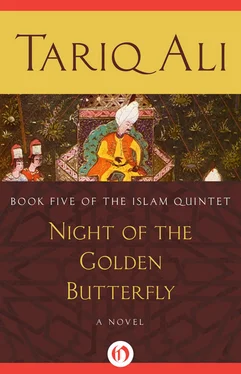Imperial agents in Guangzhou were extremely worried by how much support there was for the long-haired rebels in Yunnan. They described how even in Guangzhou people had stopped shaving their foreheads and were growing their hair to demonstrate solidarity with the government in Dali. Similar reports were coming from border towns near Tibet. Everyone assumed that the long-haired people were all Hui, but this was not the case. The Taiping rebels had also grown their hair to show contempt for the Manchu.
Father often used to say that if the Sultanate had survived another five years, the British and perhaps even the French would have recognized Yunnan as an independent state. Beijing, aware of the developing trade links between Dali and the Europeans, was determined to move swiftly and crush the Sultan’s armies.
Someone intelligent must have been advising the Qing emperor, who was told to ignore the insults — Suleiman had let it be known that his grasp of Mandarin and Chinese culture was on a much higher level than that of the Manchu barbarians in Beijing, and it is said that when the emperor was informed of this remark by his son, he became so angry that he had a seizure, and six eunuchs were required to lift him and place him on his bed. The emperor wanted to assault Dali immediately but was told the provocation was a trap and the Hui generals would wipe out the imperial army. An old palace eunuch reminded him that the European powers had won the Opium War just over a decade ago. They were waiting and watching, and if Beijing became isolated the foreigners might decide to help the Hui in Yunnan. If you attack Kunming and Dali, he told the emperor, there will be a prolonged conflict that will undermine the court, and what if some new rebellion erupts in the lower Yangtze, cutting off the supply of grain and rice? If our supply routes are cut we are finished. The long-haired rebels might even move on to Beijing reinforced by Britain and France. The Hui have been accumulating muskets and building gun-towers all over Yunnan. That is what the emperor was told, and for once he listened to his advisers and asked them to prepare an alternative method of destroying the independence of Yunnan.
That decision turned out to be our undoing. The Qing court bought some Muslim generals and made overtures to the Hui in Kunming, who were meant to be our allies, and by dividing our ranks they defeated us. That, D, is the verdict of history and the overriding weakness of Islam. Since the very beginning the followers of the Prophet have been unable to live in a single mansion. This has led to many defeats, but I fear you might be getting bored with this history lesson from an untrained historian, and so I’ve translated this document from our family’s archive that my father guarded so devotedly and which I inherited. I have now sent many of the documents and books to the museum in Yunnan, where they are displayed quite proudly.
But this one document I kept, because it was very personal. It was written by Elder Granny’s mother a few weeks before she died. She was Sultan Suleiman’s youngest sister. He had appointed her Yunnan’s trade commissioner in Burma. That’s how she survived, and later the British gave her permission to shift her operations to Calcutta. We moved to Lahore soon after her death in 1882, and only because some of the Hui who were descendants of the collaborators had established themselves in Calcutta and began to make our commercial existence difficult. My greatgrandfather refused to pay them protection money and, as a consequence, we had to leave the city.
That history is without any intrinsic value to anyone outside our family. It’s like immigrant life everywhere, and I observed similar divisions among the subcontinental Hui in the United States. Always divided by clans and political affiliations. What always amused me greatly was the facial expressions of Punjabi taxi drivers in New York and Chicago and now London when they realized I was more fluent in their language than some of them — they tend to use too many English words — and that I had understood every word uttered on the cell phones to which they are permanently attached. It was as if they had received an electric shock. I suppose it would be the same in Yunnan if a healthy, moustachioed Punjabi boy suddenly broke into our dialect. Forgive the digression.
I have translated the old document from Chinese as accurately as I could, but I could not have it double-checked by anyone in the family. Everyone is dead and your old friend Confucius has disappeared. We haven’t seen my brother for more than twenty years. Outside help I considered inappropriate. For one thing, the document is still private, and for another, I am not convinced that it is an accurate account. Also there are elements in it that are cinematic, and I would hate a tart like Zhang Yimou to be tempted. He’s wrecked enough Chinese history. Some swear words I have left in Chinese with my translation in brackets. Very mild compared to Punjabi, but more hurtful, said without a trace of affection.
I think Elder Granny’s mother was searching for other explanations. She could not quite bring herself to believe that the great betrayal was due solely to money, jealousy and an unhealthy power addiction. Many centuries ago, as you keep writing, al-Andalus and Siqilliya had already experienced what happened in Yunnan a hundred and sixty years ago. A case of those who never learn from past mistakes being destined to repeat them?
QIN-SHI, MY DEAREST child, I am writing this memorandum for you and your children and whoever comes after them. It is the story of your uncle’s last days, but also about a great deal more, as you shall read. I am not used to writing anything except trading reports and balance-sheets and, rarely and only when my brother Sultan Suleiman instructed me, detailed dossiers on the rulers of Burma and India and what we might expect from them in the future. As you know, I loved my brother dearly. He never treated women as mere bearers of children and he permitted me to marry a Han, outside our family and community, but a pure Yunnanese boy. Your father refused to leave Dali with me in 1872, even when ordered to do so by the Sultan, who was worried about his pregnant sister travelling on her own. I was three months pregnant with you and had returned to give a report on our trading situation. My brother had ruled for sixteen years, but he knew we were about to be defeated and he wanted us all to leave. Your father refused. He was killed defending the Sultan. A Han fighting the Hui traitors. His memory has never left me, which is why I never remarried, though there were more than a few offers. Together with your uncle, your father was truly the kind of man of whom our great scholar Liu Chih wrote in older times:
Only those who are the most sincere, authentic, true and real can fully realise their own nature;
Able to fully realise their own nature, they can fully realise the nature of humanity;
Able to fully realise the nature of humanity, they can fully realise the nature of things;
Able to fully recognise the nature of things, they can take part in the transforming and nourishing process of Heaven and Earth;
Once this is achieved they can form a trinity with Heaven and Earth.
Before I tell you what happened in those last months, I want you to remember that the Hui in southeastern China were never fully trusted by the Muslim people in the northwest, who were far more rigid than we were in the application of their beliefs and the observance of rituals. The Han mistrusted us because all that divided them from us was ritual. They simply could not understand how pork could be forbidden, since, unlike some Buddhists, we were not vegetarians. When they started burning our villages near Kunming before the big massacre, they would first address us impolitely as Hou didi [monkey’s brother], Gou nainai [grandmother’s a dog] and always Zhu shi ta de Zuxian pai [your ancestral tablet is a pig]. One of my great-uncles used to say that the Hui are descended from the good son of Adam who did not eat pork and the Han from the bad son who ate pork all the time. It is strange that this meat became such a big issue, but the Han regarded eating it as healthful, and many Hui noble families, ordered by the emperor to desert their faith or incur his displeasure, used to prove their loyalty by ostentatiously eating pork at court banquets. At my brother’s banquets in Dali, since there were many non-Hui Yunnanese present, pork was always served, but the polluted dishes were never kept in the palace kitchens. Our northwestern cousins would regard serving pork even to non-Hui as a heresy.
Читать дальше












